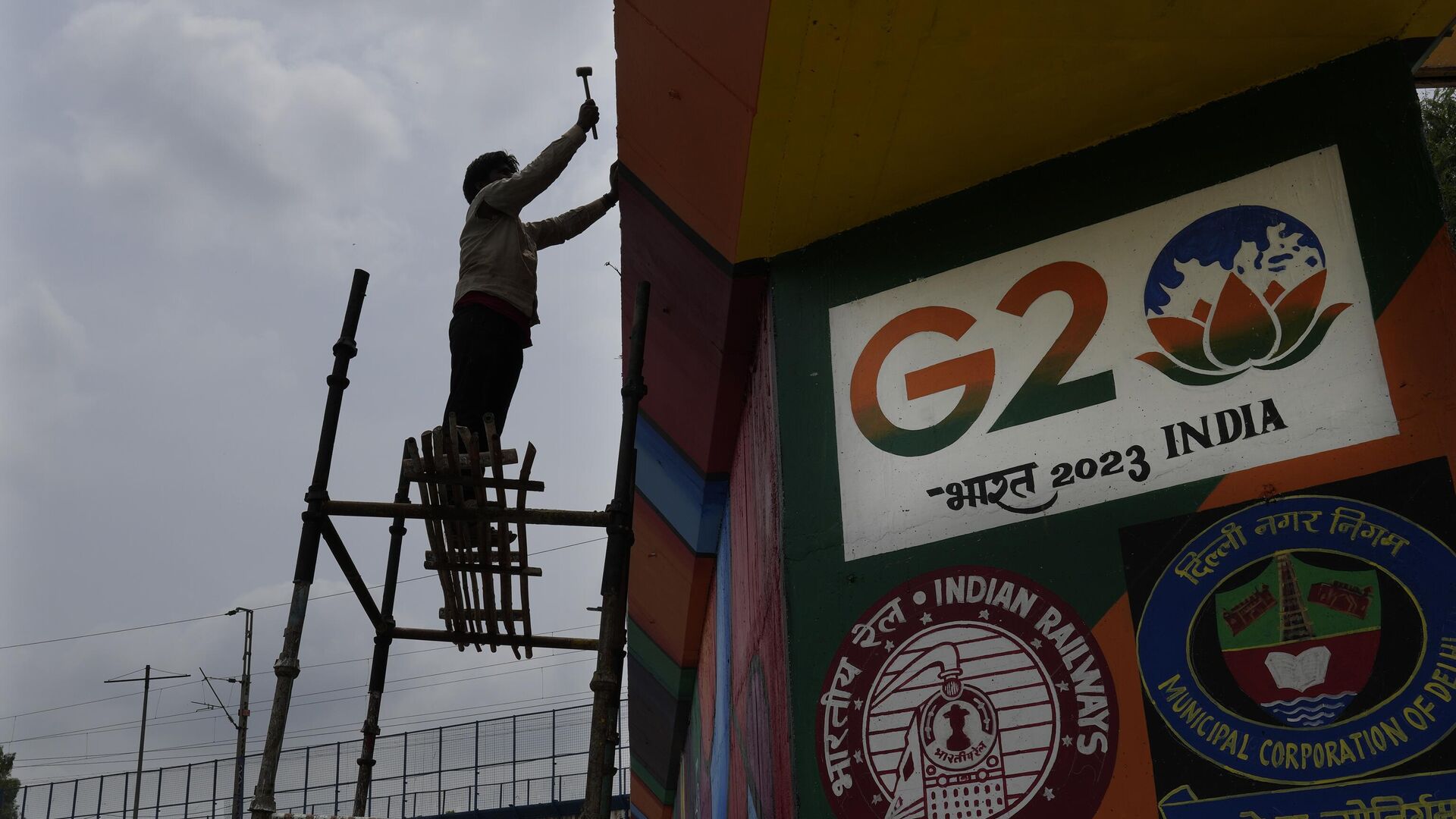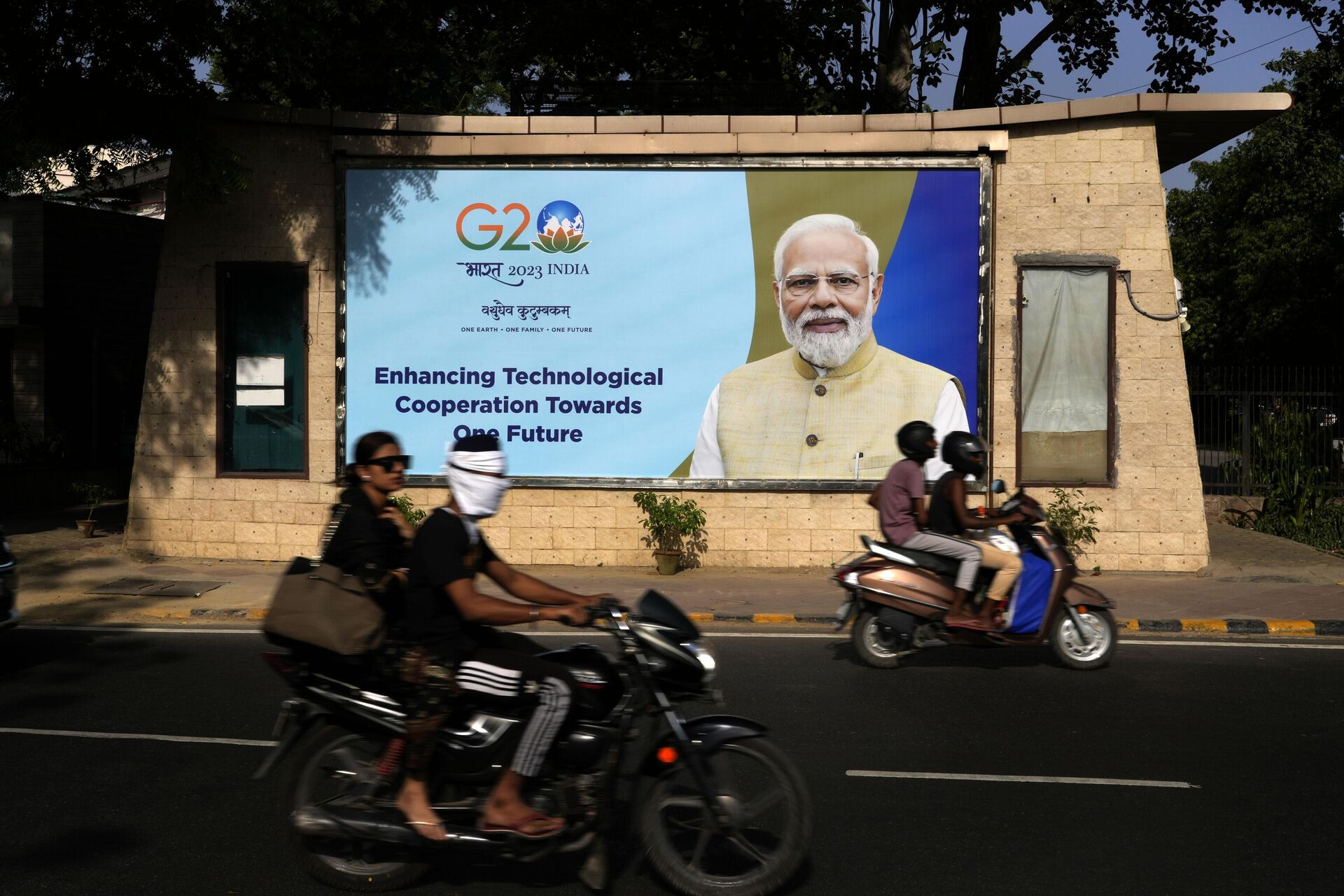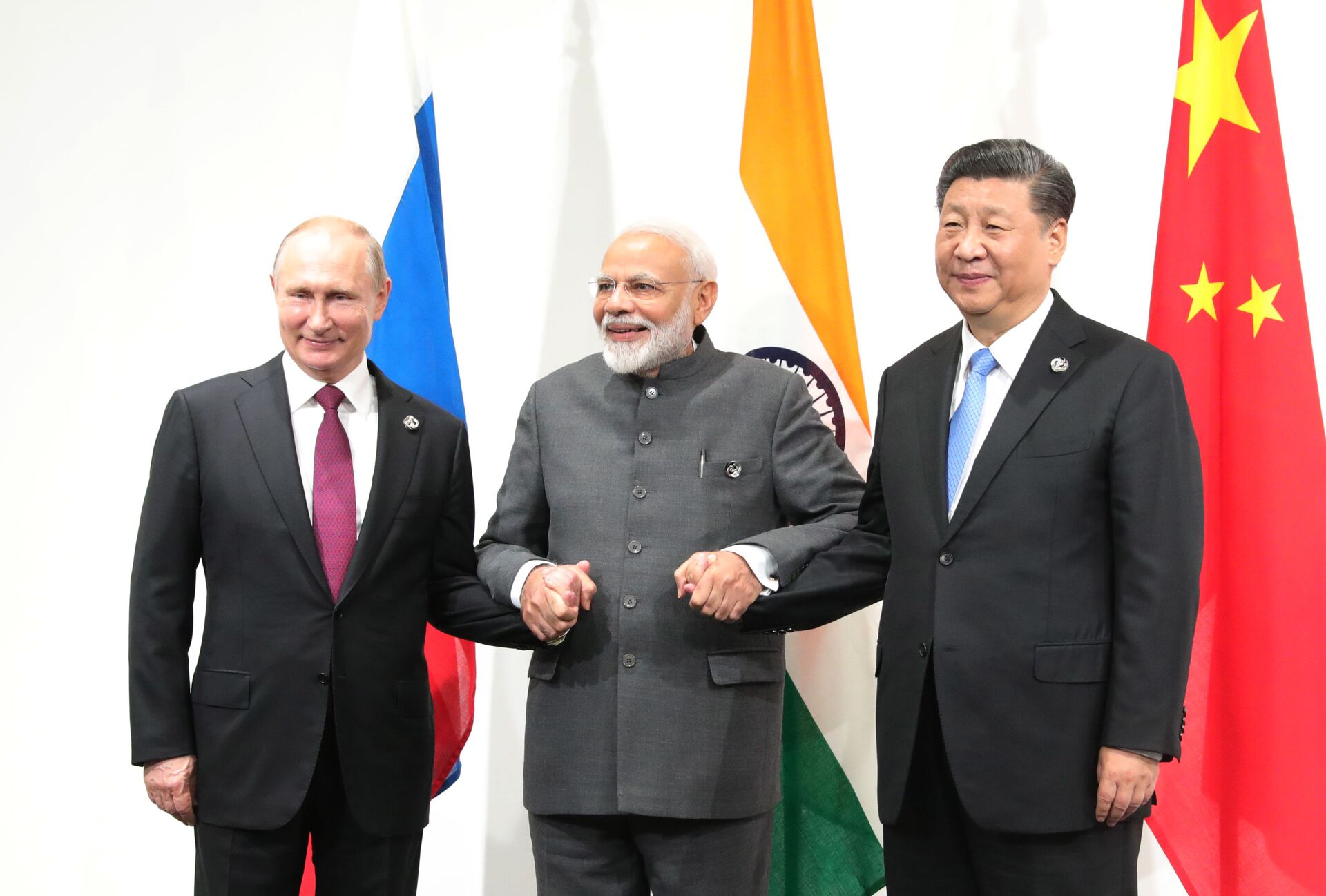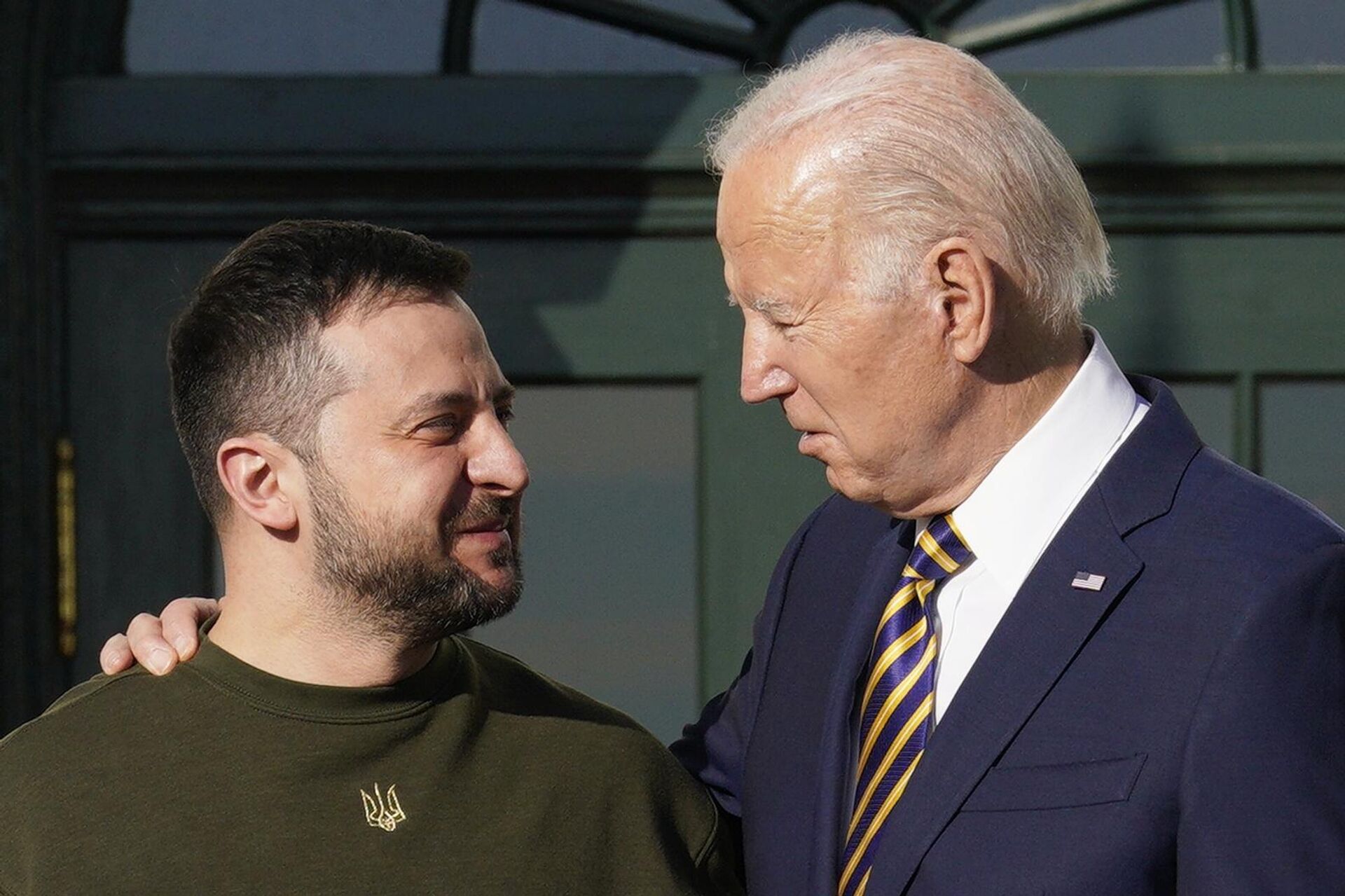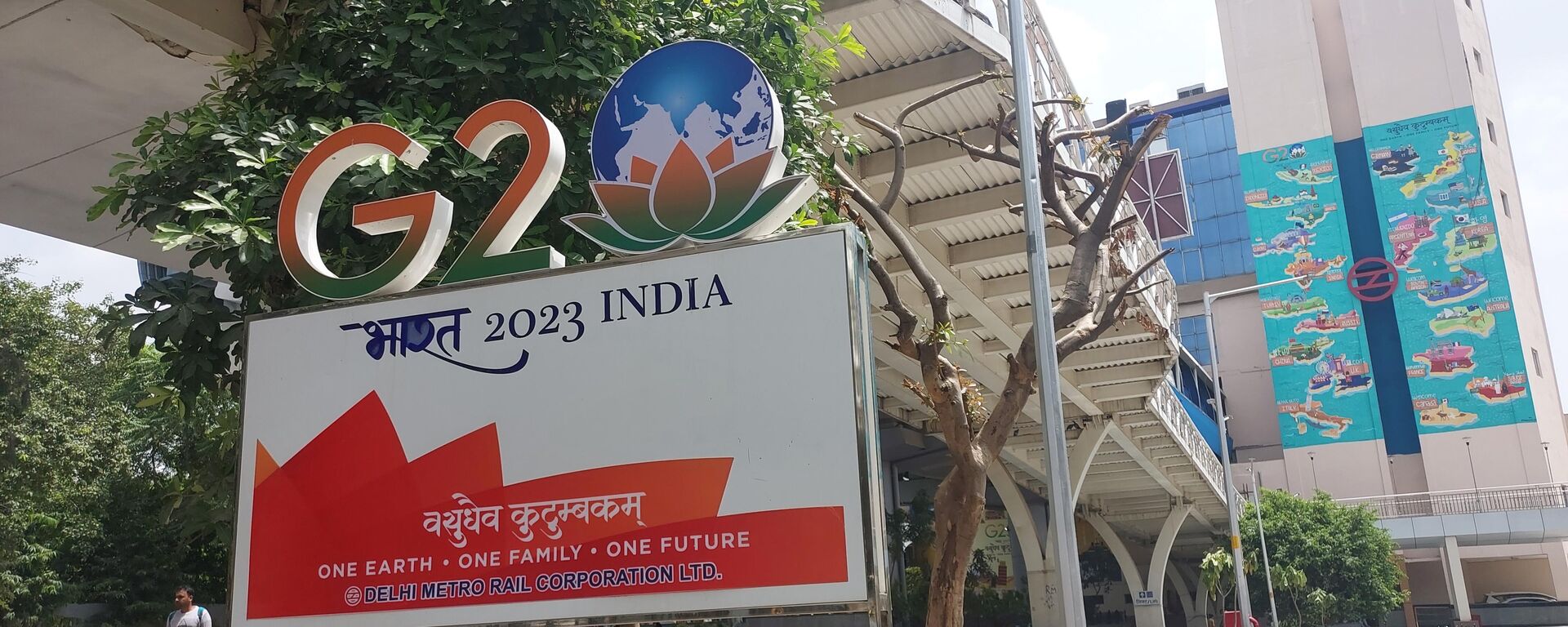https://sputniknews.in/20230907/india-gears-up-for-g-20-leaders-summit-what-should-we-expect-4011516.html
India Gears up for G-20 Leaders' Summit: What Should We Expect?
India Gears up for G-20 Leaders' Summit: What Should We Expect?
Sputnik India
The G-20 Summit in New Delhi on 9-10 September will be attended by leadership-level delegations from the world’s top 20 economies, including 19 countries and the European Union (EU).
2023-09-07T08:00+0530
2023-09-07T08:00+0530
2023-09-07T11:15+0530
g-20 summit in new delhi
india g-20 presidency
vladimir putin
narendra modi
sergey lavrov
global south
new delhi
european union (eu)
african union
g-20
https://cdn1.img.sputniknews.in/img/07e7/09/05/4048114_0:160:3072:1888_1920x0_80_0_0_70eb9e32ded0f3447dd4ee30eabea90d.jpg
The G-20 Summit in New Delhi on 9-10 September will be attended by leadership-level delegations from the world’s top 20 economies, including 19 countries and the European Union (EU).2023 G-20 Summit: Invitees & AgendaNine guest countries have been invited to the summit as “invitees” to the big event in New Delhi:The G-20 Summit will also be attended by delegations of major multilateral organizations— the United Nations, International Monetary Fund (IMF), World Bank, Asian Development Bank (ADB), World Health Organization (WHO), World Trade Organization (WTO), International Labour Organization (ILO) and Financial Stability Board (FSB).Regional mechanisms such as 10 country Association of Southeast Asian Nations (ASEAN) and 55-member African Union (AU) will also be represented at the crucial global meeting.While Russian President Vladimir Putin will be represented by his Foreign Minister Sergey Lavrov at the Summit, Chinese President Xi Jinping will also give the G-20 meeting a miss.The Chinese foreign ministry has said Beijing would be represented by Premier Li Qiang at the New Delhi summit.The theme of India’s G20 presidency is ‘Vasudhaiva Kutumbakam’, a Sanskrit phrase that translates to ‘One Earth, One Family, One Future’.What is G-20?According to official documents, the G-20 Nations is a global forum to advance international economic cooperation. The G20 members constitute nearly 85 percent of the global GDP, account for 75 percent of global trade and comprise two-third of the global population.The G20 came into being in 1999 in the wake of the Asian Financial Crisis (AFC). Back then, it was a dialogue mechanism for the finance ministers and central bank governors of the partner nations.The first G-20 Summit was held in Washington DC in November 2008.All the G7 members as well as original founding members of BRICS are represented in G20. At this year’s summit, the African Union (AU) is also expected to become a permanent G-20 member, in line with New Delhi’s commitment to amplify the concerns of Global South at the international fora like the G-20 grouping.How Does G-20 Work?According to official documents, he G20 doesn’t have a permanent secretariat as such. The group is helmed by a member state under the system of “rotating presidency”.In its working, the G20 chair is supported by the ‘troika’, which comprises the preceding, current and the next chair. Under the Indian presidency, the troika comprises Indonesia, India and Brazil.The G20 president is primarily responsible for “steering” the agenda during its presidency. The G-20 consists of two tracks—the Finance track and the Sherpa Track.The Finance track is headed by the federal finance ministers and the central bank governors.There are different working groups under the two tracks, which comprise representatives from various ministries of different groupings as well as international organizations.The G20 also comprises ‘engagement groups’, which in turn are made of civil society representatives, businesses and researchers among others.What is Special about India’s G-20 Presidency?Prime Minister Modi has stated on several occasions that India has been prioritizing the “interests” of Global South as a G20 president.At the beginning of its presidency, India convened the Voice of Global South Summit which was attended by leaders and representatives of over 125 developing nations.As a G20 president, India has called for “depoliticization” of food and fertilizer supply chains, “non-discriminatory energy markets” and urged for progress on the ‘Common Framework’ on debt treatment to address debt challenges plaguing the developing world.New Delhi has also actively lobbied for making global institutions more representative and inclusive. Leading from the front, Prime Minister Modi has lobbied the G-20 leaders for inducting the African Union as a full-fledged G20 member at the New Delhi summit.Should We Expect Final Outcome Document at G-20 Summit?The inclusion of Bali geopolitical paragraphs in the G20 final document at all the ministerial meetings under India’s G20 presidency has meant that there hasn’t been a single consensual declaration till date.The differences over Ukraine conflict among Russia and China on one hand and between western powers are likely to be reflected at the G20 Summit as well.The agenda of US President Joe Biden and Canadian Prime Minister Justin Trudeau for the G20 Summit clearly indicates that the western leaders would be vocal about Ukraine at the G20 Summit.For its part, Indian External Affairs Minister (EAM) S. Jaishankar has said that the Ukraine conflict, as a geopolitical issue, isn’t a matter for G-20 but for the UN Security Council to deliberate upon.India has also refused to buckle to western pressure to invite Ukrainian President Volodymr Zelenskyy at the G20 Summit lest his appearance takes the focus away from the developmental agenda of Global South.But, as highlighted by Prime Minister Modi over the weekend, India has achieved significant outcomes during the course of its G20 presidency till date.These include:Will India-China Differences Outshine G-20?Another crucial issue which has dominated media waves in the lead-up to the G-20 meeting is the potential absence of President Xi from the G20 meeting.Xi’s absence from the G20 meeting comes against the backdrop of growing geopolitical tensions between US and China as well as the ongoing border standoff between Indian Army and China's People’s Liberation Army (PLA) in eastern Ladakh.Significantly, both China's Xi and Russian President Putin, along with Indian PM Modi, have been major backers of the Global South and its developmental priorities.But analysts suggest that Xi’s absence wouldn’t affect the outcome of the Summit.Former Indian Ambassador to Kazakhstan, Sweden and Latvia has told Sputnik India that “substantive discussions” on various G20 issues have already taken place in various meetings held under the Indian presidency till date.Sajjanhar reckoned that Beijing's position on various issues must have been "well-known" to other G20 partner countries till now.For his part, President Putin told Prime Minister Modi during a telephone call last week that Russia was fully supportive of India’s G20 agenda, as stated by Indian Prime Minister’s Office (PMO).
https://sputniknews.in/20230904/more-g-20-nations-decline-to-endorse-western-narrative-on-ukraine-conflict-report-4032496.html
global south
new delhi
india
asean
Sputnik India
feedback.hindi@sputniknews.com
+74956456601
MIA „Rossiya Segodnya“
2023
Dhairya Maheshwari
https://cdn1.img.sputniknews.in/img/07e6/0c/13/138962_0:0:641:640_100x100_80_0_0_2cb44360dbcdf6d84bf4b299cd045917.jpg
Dhairya Maheshwari
https://cdn1.img.sputniknews.in/img/07e6/0c/13/138962_0:0:641:640_100x100_80_0_0_2cb44360dbcdf6d84bf4b299cd045917.jpg
News
en_IN
Sputnik India
feedback.hindi@sputniknews.com
+74956456601
MIA „Rossiya Segodnya“
Sputnik India
feedback.hindi@sputniknews.com
+74956456601
MIA „Rossiya Segodnya“
Dhairya Maheshwari
https://cdn1.img.sputniknews.in/img/07e6/0c/13/138962_0:0:641:640_100x100_80_0_0_2cb44360dbcdf6d84bf4b299cd045917.jpg
g 20, g-20, g 20 summit, g20, g20 summit, g-20 summit india, g-20 summit new delhi, 2023 g20 summit, 2023 g20 new delhi summit, 2023 g-20 summit in new delhi, g20 summit 2023, g20 summit 2023 news, who will host g20 summit in 2023, g20 summit 2023 start date, g20 summit 2023 date, g20 summit 2023 theme, what is g20 summit 2023, g20 countries, g20 ukraine, g20 zelenskyy, g20 global south agenda, india g20 presidency
g 20, g-20, g 20 summit, g20, g20 summit, g-20 summit india, g-20 summit new delhi, 2023 g20 summit, 2023 g20 new delhi summit, 2023 g-20 summit in new delhi, g20 summit 2023, g20 summit 2023 news, who will host g20 summit in 2023, g20 summit 2023 start date, g20 summit 2023 date, g20 summit 2023 theme, what is g20 summit 2023, g20 countries, g20 ukraine, g20 zelenskyy, g20 global south agenda, india g20 presidency
India Gears up for G-20 Leaders' Summit: What Should We Expect?
08:00 07.09.2023 (Updated: 11:15 07.09.2023) India is all set to host the 18th G-20 Summit at New Delhi’s ‘Bharat Mandapam’ convention centre on 9-10 September. The summit is the concluding event of India’s year-long presidency.
The G-20 Summit in New Delhi on 9-10 September will be attended by leadership-level delegations from the world’s top 20 economies, including 19 countries and the European Union (EU).
2023 G-20 Summit: Invitees & Agenda
Nine guest countries have been invited to the summit as “invitees” to the big event in New Delhi:
the United Arab Emirates (UAE).
The G-20 Summit will also be attended by delegations of major multilateral organizations— the United Nations, International Monetary Fund (IMF), World Bank,
Asian Development Bank (ADB), World Health Organization (WHO), World Trade Organization (WTO), International Labour Organization (ILO) and Financial Stability Board (
FSB).
Regional mechanisms such as 10 country Association of Southeast Asian Nations (
ASEAN) and 55-member
African Union (AU) will also be represented at the crucial global meeting.
While Russian President Vladimir Putin will be represented by his Foreign Minister Sergey Lavrov at the Summit, Chinese President Xi Jinping will also
give the G-20 meeting a miss.
The Chinese foreign ministry has said Beijing would be represented by Premier Li Qiang at the New Delhi summit.
As a concerted effort to advocate for concerns of developing nations of Global South, India’s G20 presidency has been marked by prioritizing issues like food and fertilizer security, reforms of multilateral development banks (MDBs) and institutions to make them more inclusive, addressing debt distress, achieving the Sustainable Development Goals (SDGs) and green transition.
The theme of India’s G20 presidency is ‘Vasudhaiva Kutumbakam’, a Sanskrit phrase that translates to ‘One Earth, One Family, One Future’.
According to official documents, the G-20 Nations is a global forum to advance international economic cooperation.
The G20 members constitute nearly 85 percent of the global GDP, account for 75 percent of global trade and comprise two-third of the global population.
The G20 came into being in 1999 in the wake of the Asian Financial Crisis (AFC). Back then, it was a dialogue mechanism for the finance ministers and central bank governors of the partner nations.
In 2008, the G-20 grouping was elevated to the leaders’ level and designated as the “premier forum for international economic cooperation”. The increased influence of the grouping happened after the Global Financial Crisis (GFC) of 2008.
The first G-20 Summit was held in Washington DC in November 2008.
All the G7 members as well as original founding members of BRICS are represented in G20. At this year’s summit, the African Union (AU) is also expected to become a permanent G-20 member, in line with New Delhi’s commitment to amplify the concerns of Global South at the international fora like the G-20 grouping.
According to official documents, he G20 doesn’t have a permanent secretariat as such. The group is helmed by a member state under the system of “rotating presidency”.
The G20 says that the members are broadly structured into five groups. Group 1 comprises Australia, Canada, Saudi Arabia and the United States, while India, Russia, South Africa and Türkiye constitute Group 2. Group 3 includes Argentina, Brazil, and Mexico, Group 4 has France, Germany, Italy, and United Kingdom and finally Group 5 is made up of China, Indonesia, Japan, and South Korea, according to G20 website.
In its working, the G20 chair is supported by the ‘troika’, which comprises the preceding, current and the next chair. Under the Indian presidency, the troika comprises Indonesia, India and Brazil.
The Indian presidency of G-20 marks the first instance when the G-20 is helmed by a troika of developing countries, a trend which will continue under the Brazilian presidency as well. After. Brazil, South Africa is scheduled to hold the G-20 presidency.
The G20 president is primarily responsible for “steering” the agenda during its presidency. The G-20 consists of two tracks—the Finance track and the Sherpa Track.
The Finance track is headed by the federal finance ministers and the central bank governors.
There are different working groups under the two tracks, which comprise representatives from various ministries of different groupings as well as international organizations.
The G20 also comprises ‘engagement groups’, which in turn are made of civil society representatives, businesses and researchers among others.
Indian Prime Minister Narendra Modi said in an interview to Press Trust of India (PTI) news agency over the weekend that over 220 meetings across 60 cities across India will have taken place under India’s G20 presidency once the presidency formally concludes in November.
What is Special about India’s G-20 Presidency?
Prime Minister Modi has stated on several occasions that India has been prioritizing the “interests” of Global South as a G20 president.
At the beginning of its presidency, India convened the Voice of Global South Summit which was attended by leaders and representatives of over 125 developing nations.
As a G20 president, India has called for “
depoliticization” of food and fertilizer supply chains,
“non-discriminatory energy markets” and urged for progress on the
‘Common Framework’ on debt treatment to address debt challenges plaguing the developing world.
New Delhi has also actively lobbied for making global institutions more representative and inclusive. Leading from the front, Prime Minister Modi has lobbied the G-20 leaders for inducting the African Union as a full-fledged G20 member at the New Delhi summit.
In fact, African countries have been appreciative of India’s agenda. An African ambassador to India has told Sputnik that no G20 presidency has been so much vocal about the concerns of Global South as India has been during its chairmanship of the inter-governmental grouping.
Should We Expect Final Outcome Document at G-20 Summit?
The inclusion of Bali geopolitical paragraphs in the G20 final document at all the ministerial meetings under India’s G20 presidency has meant that there hasn’t been a single consensual declaration till date.
The differences over Ukraine conflict among Russia and China on one hand and between western powers are likely to be reflected at the G20 Summit as well.
The agenda of US President Joe Biden and Canadian Prime Minister Justin Trudeau for the G20 Summit clearly indicates that the western leaders would be
vocal about Ukraine at the G20 Summit.
For its part, Indian External Affairs Minister (EAM) S. Jaishankar has said that the Ukraine conflict, as a geopolitical issue, isn’t a matter for G-20 but for the UN Security Council to deliberate upon.
It's worth noting that India has allegedly put forward a draft declaration which "lacks" any statement "condemning" Russia for its special military operation, a US media report claimed citing a EU official.
India has also refused to buckle to western pressure to invite Ukrainian President Volodymr Zelenskyy at the G20 Summit lest his appearance takes the focus away from the developmental agenda of Global South.
Russian Foreign Minister Sergey Lavrov indicated over weekend that there wouldn’t be a “general declaration” at the Summit if Moscow’s position on Ukraine wasn’t reflected in the Summit declaration.
But, as highlighted by Prime Minister Modi over the weekend, India has achieved significant outcomes during the course of its G20 presidency till date.
Adopting a G20 ‘Action Plan’ to accelerate progress on SDGs;
‘Deccan High Level Principles on Food Security and Nutrition’ to address global food crisis;
G20 Consensus on bridging digital gender divide and increasing women participation in labour force;
G20 high-level principles on ‘Green Hydrogen’ and setting up a ‘Global Biofuels Alliance’;
G20 agreement to digitize trade documents;
Agreement on developing an ‘international reference for the classification of occupations’;
G20 push to reduce land degradation by 50 percent by 2040.
Will India-China Differences Outshine G-20?
Another crucial issue which has dominated media waves in the lead-up to the G-20 meeting is the potential absence of President Xi from the G20 meeting.
Xi’s absence from the G20 meeting comes against the backdrop of growing geopolitical tensions between US and China as well as the
ongoing border standoff between Indian Army and China's People’s Liberation Army (
PLA) in eastern
Ladakh.
Significantly, both China's Xi and Russian President Putin, along with Indian PM Modi, have been
major backers of the Global South and its developmental priorities.
But analysts suggest that Xi’s absence wouldn’t affect the outcome of the Summit.
Former Indian Ambassador to Kazakhstan, Sweden and Latvia has told Sputnik India that “substantive discussions” on various G20 issues have already taken place in various meetings held under the Indian presidency till date.
"In substantive terms, the leaders' absence won't have any impact on the G20 outcome document. China has actively participated in all the major G20 meetings till now, including at the foreign ministers in March," Sajjanhar stated.
Sajjanhar reckoned that Beijing's position on various issues must have been "well-known" to other G20 partner countries till now.
For his part, President Putin told Prime Minister Modi during a
telephone call last week that Russia was fully supportive of India’s G20 agenda, as stated by Indian Prime Minister’s Office (PMO).
